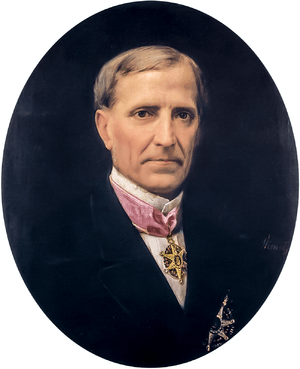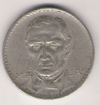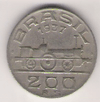Irineu Evangelista de Sousa, Viscount of Mauá facts for kids
Quick facts for kids
Irineu Evangelista de Sousa
|
|
|---|---|

Irineu Evangelista de Sousa, c.1872
|
|
| Born | 28 December 1813 Arroio Grande, Rio Grande do Sul, Brazil (Portuguese Colony)
|
| Died | 21 October 1889 (aged 76) |
| Occupation | Business magnate; investor |
| Net worth | $60 billion USD (2009 dollars) |
Irineu Evangelista de Sousa, known as the Viscount of Mauá (1813–1889), was a very important Brazilian businessman, industrialist, banker, and politician. He came from a family of small ranchers, called estancieiros. Mauá became one of the richest people in the world. By 1867, his wealth was even bigger than the entire yearly budget of the Brazilian Empire.
In 1871, the New York Times newspaper called him "the Rothschild of the South American continent." This meant he was as powerful and wealthy as the famous Rothschild banking family in Europe. He was given the titles of baron in 1854 and viscount with greatness (visconde com grandeza) in 1874. These titles showed his high status.
Mauá was a pioneer, meaning he was one of the first to do many new things in Brazil's economy. One of his biggest achievements was starting the construction of the Mauá Railroad. This was the very first railroad ever built in Brazil.
Contents
Mauá's Business Empire
At his most successful, Mauá controlled eight out of the ten largest companies in Brazil. The other two were owned by the government. His banking businesses reached across the world to Britain, France, the United States, and Argentina. Mauá also started the first bank in Uruguay, called Banco Mauá Y Cia.
Financing Brazil's Growth
Mauá helped create the modern Banco do Brasil, which is a very important bank. He is known for helping to pay for much of Brazil's economic activities in the 1800s. This included supporting coffee plantations, which were a major part of Brazil's economy.
He also funded the building of Brazil's first railroads. He helped build the first shipyard and the first cast iron metalwork factories in the country. These were big steps for Brazil's industry.
New Technologies and Services
Mauá was also involved in bringing new technologies to Brazil. He paid for the first telegraphic submarine communications cable. This cable connected South America to Europe, making communication much faster.
He also developed commercial transportation using steamboats on the Amazon and Guaíba rivers. This made it easier to move goods and people. In the city of Rio de Janeiro, which was Brazil's capital then, Mauá installed the first gas-fueled street lights. This made the city much brighter and safer at night.
Challenges and Decline
Later in his life, Mauá's fortunes changed. After the Paraguayan War, the Brazilian Empire faced many problems. This affected Mauá's businesses, and he began to lose his wealth. By the time he died, he had lost most of his money.
Legacy and Honors
During his time, Brazil's economy was mostly controlled by landowners who focused on exporting goods and used enslaved people for labor. Mauá, however, believed in different ideas. He supported free enterprise, which means businesses should be free to operate without too much government control. He also believed in liberalism, industrialization, and ending slavery.
After his death, Mauá received many honors and recognitions for his contributions:
- He is considered the patron, or protector, of the Ministry of Transport in Brazil.
- The city of Visconde de Mauá is named after him.
- The Baron of Mauá International Bridge connects the city of Jaguarão in Brazil with Río Branco, Uruguay.
- The day celebrating the merchant navy (ships used for trade) in Brazil is on Mauá's birthday, December 28th. This is because of his important work at the Ponta d'Areia shipyard.
See also
 In Spanish: Irineu Evangelista de Sousa para niños
In Spanish: Irineu Evangelista de Sousa para niños



